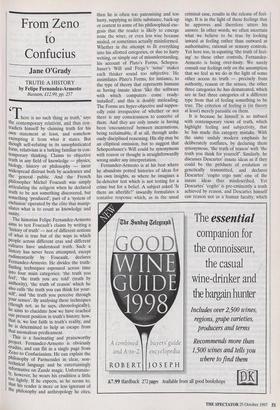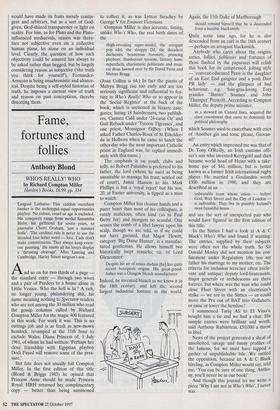From Zeno to Confucius
Jane O'Grady
TRUTH: A HISTORY by Felipe FernandezArmesto Bantam, £12.99, pp. 257 There is no such thing as truth,' says the contemporary relativist, and thus con- tradicts himself by claiming truth for his own statement at least, and somehow exempting it from what it states. But though self-refuting in its unsophisticated form, relativism is a lurking familiar in con- temporary thinking. Claims to objective truth in any field of knowledge — physics, biology, history or philosophy — incur widespread distrust both by academics and the general public. And the French Philosopher Michel Foucault was simply articulating the zeitgeist when he declared truth to be not something discovered, but something 'produced', part of a 'system of exclusion' operated by the elite that manip- ulates what is to count as knowledge and sanity.
The historian Felipe Fernandez-Armesto aims to test Foucault's claims by writing a `history of truth' — not of different notions of what is true but of the ways in which People across different eras and different Cultures have understood truth. Such a history has never been attempted, except rudimentarily by Foucault, declares Fernandez-Armesto. He divides the truth- finding techniques espoused across time into four main categories: 'the truth you feel', 'the truth you are told' (truth by authority), 'the truth of reason' which he also calls 'the truth you can think for your- self, and 'the truth you perceive through your senses'. By analysing these techniques (though not, as he says, chronologically), he aims to elucidate how we have reached our present position in truth's history; how, that is, we lost faith in truth's reality, and he is determined to help us escape from that anomalous predicament. This is a fascinating and praiseworthy Project. Fernandez-Armesto is obviously erudite, and can flit in a single page from Zeno to Confucianism. He can explain the Philosophy of Parmenides in clear, non- technical language and be entertainingly informative on Zande magic. Unfortunate- ly, however, he wears his erudition a little t°0 lightly. If he expects, as he seems to, that his reader is more or less ignorant of the philosophy and anthropology he cites, then he is often too patronising and too hasty, supplying so little substance, back-up or context to some of his philosophical exe- gesis that the reader is likely to emerge none the wiser, or even less wise because misled, or sometimes actually misinformed. Whether in the attempt to fit everything into his allotted categories, or due to hasty writing, or simply out of misunderstanding, his account of Plato's Forms, Schopen- hauer's Will and Frege's 'sense' makes each thinker sound too subjective. He assimilates Plato's Forms, for instance, to the type of theory that represents humans as having innate ideas 'like the software with which computers come ready- installed', and this is doubly misleading. The Forms are hyper-objective and suppos- edly exist irrespective of whether or not there is any consciousness to conceive of them. And they are only innate in having been 'encountered' between incarnations, being reclaimable, if at all, through ardu- ously disciplined reasoning. His slip may be an elliptical omission, but to suggest that Schopenhauer's Will could be synonymous with reason or thought is straightforwardly wrong under any interpretation. Fernandez-Armesto is at his best where he abandons potted histories of ideas for his own insights, as where he imagines a lie-detector test which is not testing for a crime but for a belief. A subject asked 'Is there an afterlife?' inwardly formulates a tentative response which, as in the usual criminal case, results in the release of feel- ings. It is in the light of these feelings that he approves and therefore utters his answer. In other words, we often ascertain what we believe to be true by looking inward at feeling rather than outward at authoritative, rational or sensory controls. Yet here too, in equating 'the truth of feel- ing' to these other controls, Fernandez- Armesto is being over-hasty. We surely consult our feelings only on the assumption that we feel as we do in the light of some other access to truth — precisely from authority, reason or the senses, the other three categories he has demarcated, which are in fact three categories of a different type from that of feeling something to be true. The criterion of feeling is (in theory at least) merely parasitic on them.
It is because he himself is so imbued with contemporary views of truth, which highlight feeling and subjectivity, that he has made this category mistake. With the same unduly modern emphasis he deliberately conflates, by declaring them synonymous, 'the truth of reason' with 'the truth you think for yourself. Similarly, he discusses Descartes' innate ideas as if they could be the prdducts of evolution or genetically transmitted, and declares Descartes' cogito ergo sum' one of the innate ideas thus misdescribed. Yet Descartes' cogito' is pre-eminently a truth achieved by reason, and Descartes himself saw reason not as a human faculty, which would have made its fruits merely contin- gent and arbitrary, but as a sort of God- given, God-shared transparency or light on reality. For him, as for Plato and the Plato- influenced mediaevals, reason was there- fore not subjective even on a collective human plane, let alone on an individual level. Clearly, the question of how such objectivity could be assured has always to be asked rather than begged, but by largely considering reason as subjective (`the truth you think for yourself), Fernandez- Armesto is being anachronistic and ahistor- ical. Despite being a self-styled historian of truth, he imposes a current view of truth and reason on past conceptions, thereby distorting them.



















































































 Previous page
Previous page